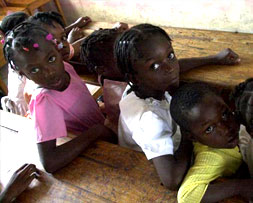 In addition to the current political, social, and economic crises, Haiti faces a future threatened by an education infrastructure that is in a state of collapse. Today, only 50 percent of the population is literate, the primary school enrollment rate is only 65 percent (fewer than 30 percent of children who do enter primary school make it through the sixth grade), and the country’s approximately 12,000 primary schools are kept operational mainly though the assistance of private-sector organizations, including regional and international NGOs, religious groups, and community organizations. Most Haitians cannot afford to send their children to school, as tuition fees range from $6 to $9 per month — a small fortune in a country where the average monthly wage is $12. Still, despite these obstacles, some persistent and innovative educational programs are trying to make a difference for future generations of Haitians.
In addition to the current political, social, and economic crises, Haiti faces a future threatened by an education infrastructure that is in a state of collapse. Today, only 50 percent of the population is literate, the primary school enrollment rate is only 65 percent (fewer than 30 percent of children who do enter primary school make it through the sixth grade), and the country’s approximately 12,000 primary schools are kept operational mainly though the assistance of private-sector organizations, including regional and international NGOs, religious groups, and community organizations. Most Haitians cannot afford to send their children to school, as tuition fees range from $6 to $9 per month — a small fortune in a country where the average monthly wage is $12. Still, despite these obstacles, some persistent and innovative educational programs are trying to make a difference for future generations of Haitians.
FONHEP (Fondation Haïtienne de l’Enseignement Privé) reaches more than 23,000 students in the western and northern departments of the country, training teachers, providing materials and management, and reaching out to parents. Another FONHEP initiative is currently creating community-owned and -managed schools in the Central Plateau and Artibonite Valley regions. In collaboration with the EDC (Education Development Center), FONHEP has broadcast a radio-based distance-learning program since the early 1990s; airing games, songs, dramas, and activities five mornings a week to assist teachers in remote locations. The curriculum includes Creole, math, civic education, health, and environmental issues. Yele Haiti, founded by Haitian-born musician Wyclef Jean, currently provides scholarships to 3,600 children at 70 schools in the Gonaives area, and is renovating 20 schools damaged by tropical storm Jeanne in 2004, serving another 12,000 students. Project Teach/Konbit Pwof focuses on teacher training, running yearly professional development seminars for 250 to 300 Haitian teachers and administrators — many of whom have only sixth-grade educations. The program arranges for volunteer teachers to run two-week workshops on effective ways of teaching, classroom management, school administration, and alternatives to corporal punishment.
- Previous: Economics


